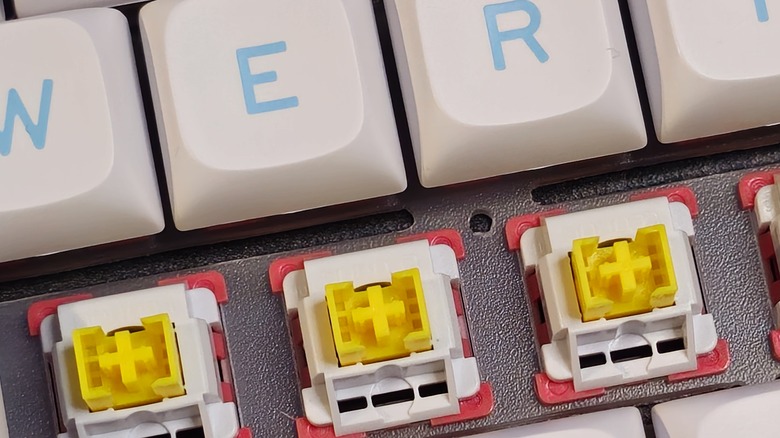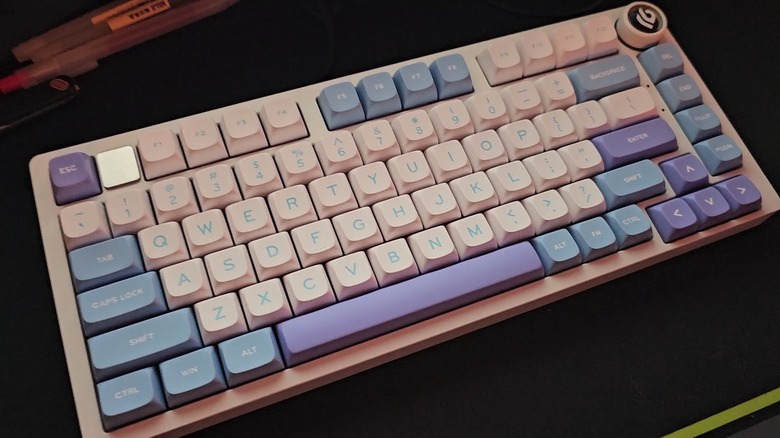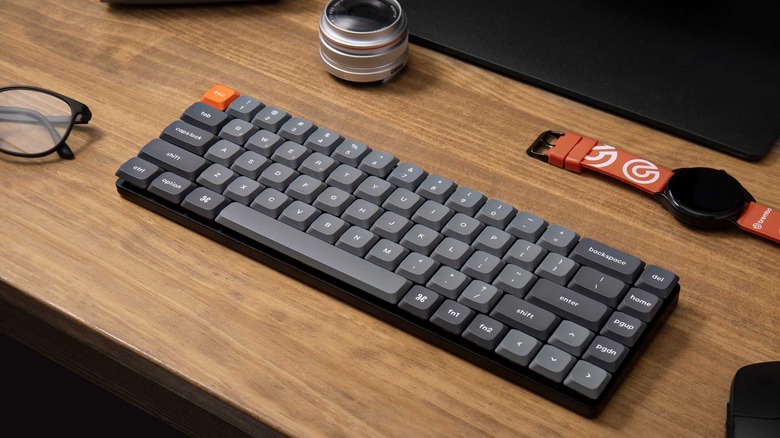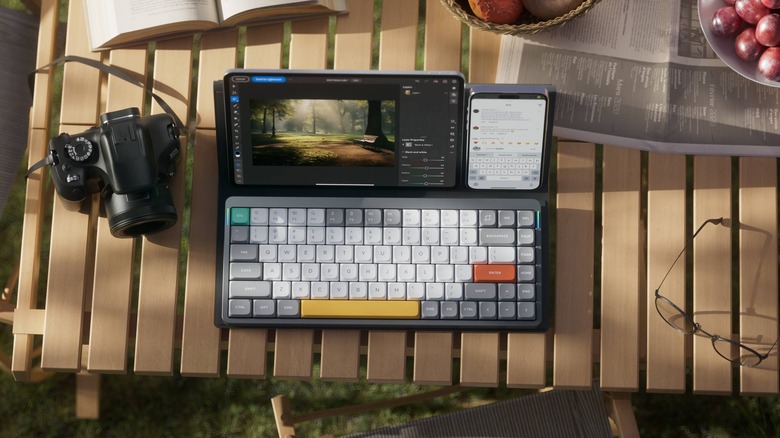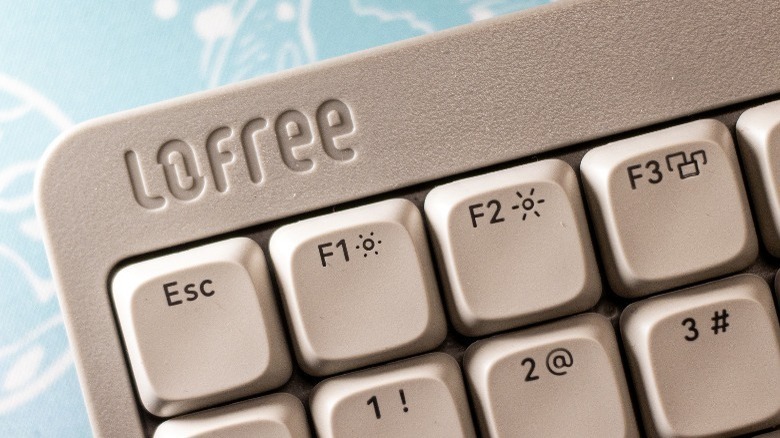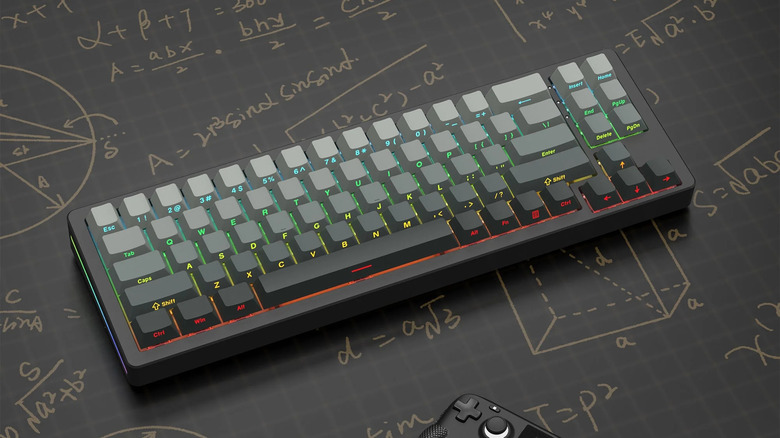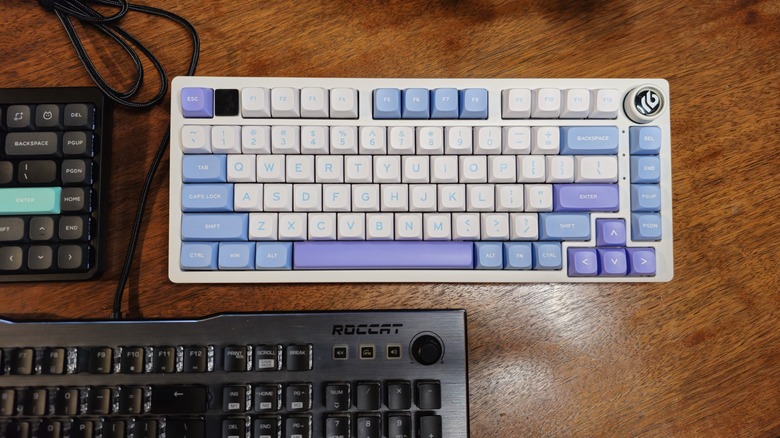5 Of The Most Reliable Mechanical Keyboard Brands (And What To Look For Before Buying)
In a time when more people spend more time in front of a computer than ever before, it's no wonder that the mechanical keyboard market has started to boom. While the slim scissor switch keyboards — the kind with low travel found on most laptops or in products like the Apple Magic Keyboard — were an important innovation that made it possible to create razor-thin products, they provide few, if any, advantages outside of their slimness. Mechanical keyboards provide a better and infinitely more customizable typing experience, which can help you type faster and more comfortably. Aside from general typing, mechanical keyboards are often sought out by gamers for their superior performance and by casual users simply for their aesthetic qualities.
The best mechanical keyboard brands deliver enthusiast features paired with quality builds and affordable prices. We're talking stuff like metal construction, gasket-mounted PCB plates, acoustic case foam, and bespoke, pre-lubricated switches. Those features used to extract a high premium for the privilege, but as the mechanical keyboard market has continued to grow, competition has forced those prices down. While the biggest name brands still charge a pretty penny for keyboards lacking some or all of the features enthusiasts care about, upstart brands from Asia to America are fighting tooth and nail for a share of the high-end market. So, if you're hoping to get a mechanical keyboard for you or a loved one this season, here are just a few of the most reliable mechanical keyboard brands in 2024.
Epomaker
Known for its enthusiast-grade keyboards at affordable prices, Epomaker has won the hearts and fingertips of its customers through the sheer variety of keyboards it offers. Whether you want a keyboard that looks like a panda or one that looks like it fell off the paneling of an industrial warehouse, Epomaker has you covered. With vendors including Aula, LeoBog, and Feker under its wing, Epomaker has built out a wide array of surprisingly reliable options for newcomers to the world of mechanical keyboards and veterans alike.
I'm currently in progress on a review of the Epomaker x LeoBog Hi75, which is one of the best out-of-the-box typing experiences I've ever had for under $100. Other keyboards like the Aula F75, which has garnered rave reviews at the even cheaper price of $80, is an equally impressive value package given its gasket mounting, five-layer acoustic padding, and the ability to get LeoBog Reaper Switches. Having tested those switches, they're worth the cost of admission on their own. At the time of writing, the Aula75 has been dropped down to $64 on Amazon, and if that's not the case by the time you read this, just know that Epomaker has a ton of sales year-round.
Keychron
As one of the preeminent companies currently in the mechanical keyboard market, Keychron supplies a range of keyboards in various configurations and price points. Among keyboard enthusiasts, the company is known for its reliability, as well as its eyebrow-raising prices. The best thing about a Keychron product is that you know it's going to work for years to come, while the downside is that you need to drop some serious cash to get the best performance out of the box.
Keychron's biggest strength as a brand is its variety, with keyboards that span the gamut from 40% to 100% layouts, including southpaw and split designs, and available in multiple product lines. For those dipping their toes into the world of mechanical keyboards, the K line is a great starting point, featuring sleek designs, hot-swappable switches, and Bluetooth support, while the V series is budget-friendly. Meanwhile, aficionados will appreciate the Q series, which caters to them with features like gasket-mounted designs, sound-absorbing foam, and so forth. However, many enthusiasts will still choose to perform DIY modifications to Keychron products, swapping out keycaps and switches, opening up the case to make interior alterations, and so forth.
Keychron keyboards are extremely reliable and well-built, so it's hard to go wrong with any of its products. As my first real mechanical keyboard, the Keychron K8 occupies a special place in my collection. At the same time, the market has become quite competitive since Keychron first arrived on the scene, so its keyboards are no longer the value proposition they once were. Still, its inclusion on this list is well deserved.
NuPhy
If you're shopping around for good-looking and convenient mechanical keyboards, there's a good chance you'll happen across NuPhy. This Chinese brand has been delivering some serious contenders to the keyboard scene, especially when it comes to its Air line of low-profile keyboards. Low profile is just another way of saying that a keyboard is thin despite being mechanical, delivering the portability and aesthetics of a less performant keyboard like Apple's Magic Keyboard despite remaining mechanical. While not quite as slim as that, they're much closer than a normal-sized mechanical keyboard.
NuPhy's full-fat mechanical keyboards, such as its Halo series, get great reviews, but the real stars are its low-profile Air and Nos series, having earned NuPhy its reputation for keyboards that can provide incredible typing experiences on the go. As an owner of the NuPhy Air75 V2, which regularly tops lists of the best low-profile keyboards, I can confirm that despite being a little bit clacky out of the box, it's my favorite keyboard simply because I can bring it anywhere. The separately purchased NuFolio not only wraps the Air75 V2 up in a faux-leather shell but transforms it into a tablet stand that keeps the keyboard from sliding around with magnetic placeholders. I'm using that setup, pictured in my recent column about replacing my laptop with Samsung DeX, to write this very roundup, where you can see the Air75 V2 in action.
Lofree
Lofree is another company that's made its name in low-profile keyboards, though its entire range is well known by now among dedicated keyboard enthusiasts. Its Flow and Edge lines of low-profile keyboards have been preferred over NuPhy's by some enthusiasts, and its many normal-profile boards are equally attractive options. The Flow84 low-profile keyboard deserves particular credit for shaking up the low-profile keyboard scene and proving that NuPhy has competition hot on its heels. While SlashGear hasn't tested it, reviewers rave, with one Amazon customer writing, "It sounds and feels like a bigger, more expensive keyboard."
Meanwhile, SlashGear's Jowi Morales awarded the Lofree Flow Lite100 an impressive 9/10 review score thanks to its premium feeling build quality, its quiet, tactile switches, and its ability to connect to a whopping five devices simultaneously. Given that the Flow Lite100 manages to accomplish that much with a plastic build, it's clear that, as the kids say, they understand the assignment. The only downside to Lofree is its price, with several keyboards that rocket past the $200 mark and the cheapest sitting pretty at $90.
Womier
Another company known for high-performance mechanical keyboards at budget prices is Womier. With a wide range of layouts, designs, switches, and keycaps, Womier has gone from a relatively unknown quantity to being recommended by some reviewers as having the best budget mechanical keyboard on the market. That board, in particular, the Womier SK71, is regarded as a great value package due to its aluminum construction, gaskets, acoustic dampening foam, and surprisingly great linear switches.
Moreover, if you want a keyboard that stands out as the centerpiece of your desk, Womier has you covered with a wide range of designs and keycap sets. Whether you're drawn to the '90s retro computer aesthetic, love to cover your space in pastel purples and pinks, or want your keyboard keys to be coated in cute cartoon bears or cats, Womier has what you're looking for. I currently have my eye on the Womier M87 Pro because I love the way it combines '90s officecore with a splash of primary color.
Womier also carries great keyboards for gaming, as some of its products use Hall effect switches, which use magnetic sensors to detect input and are, therefore, less prone to wear and tear over time compared to traditional mechanical switches. Like its other keyboards, Womier's hall effect keyboards are very aesthetically pleasing. Take the M68 HE, which, in addition to pro gamer features like a rapid trigger, has a wonderful topographic design. But just like other Womiers, it's affordable at just $67 at the time of this writing.
The keyboard rabbit hole - why pick a specialty brand?
You may notice within this list a conspicuous lack of widely known brands like Logitech, Razer, or Corsair, which make mechanical keyboards. That's not because those brands don't make good products. A look through SlashGear's archives will reveal that we've often given their products, including keyboards, rave reviews. However, at the end of the day, they don't specialize in keyboards, which means they fail more often than not to focus on the features that matter to mechanical keyboard enthusiasts.
They're slowly but surely beginning to pay attention to the enthusiast market, but while they occasionally crank out a keyboard that aims to draw the eyes of hobbyists, they tend to charge high prices relative to those products. When Razer asks a whopping $190 for its BlackWidow V4 keyboard, it doesn't matter that they finally added things like a gasket-mounted plate, tape-enhanced PCB, or lubricated stabilizers and dampening foam. Many of the keyboards name-dropped in this article have all of that for less money — even under $100 — and feel better to type on. And yes, fellow gamers, that cheaper board will still have RGB.
